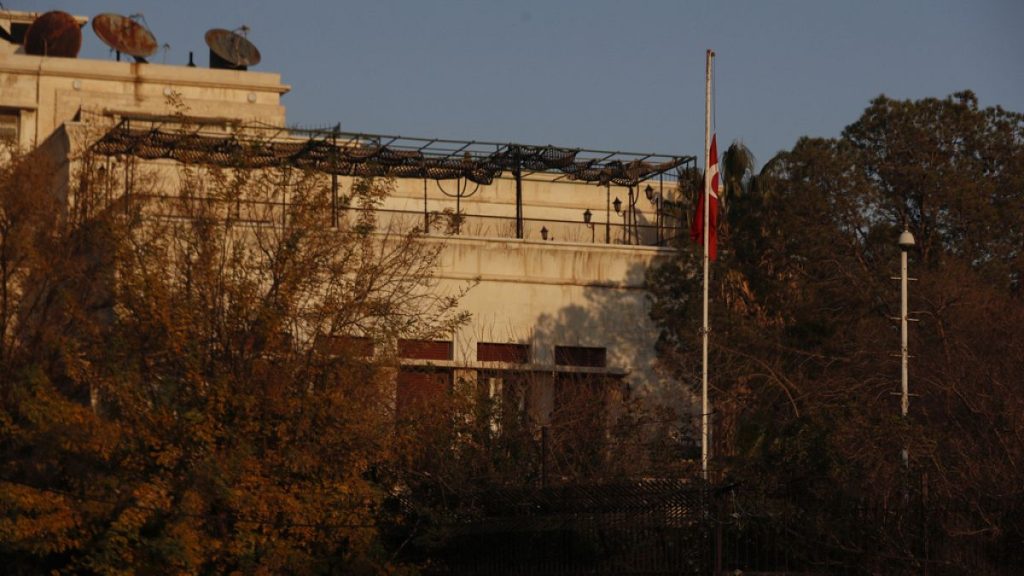The reopening of the Turkish embassy in Damascus marks a pivotal moment in the evolving Syrian political landscape, signifying a potential shift in regional dynamics and the trajectory of Syria’s future. This move by Turkey, the first country to reinstate its diplomatic presence since the overthrow of Bashar al-Assad’s regime, carries significant weight, given Turkey’s past support for some of the insurgent groups involved in the upheaval. The resumption of diplomatic relations, severed in 2012 amidst the escalating Syrian civil war, underscores a changing geopolitical calculus and potentially a recalibration of Turkey’s approach towards the newly established power structure in Syria. This bold step by Turkey raises questions about the future of Syrian-Turkish relations and the broader regional implications, particularly regarding the refugee crisis, the fight against terrorism, and the stabilization of Syria.
The timing of the embassy’s reopening is particularly noteworthy, coinciding with high-level diplomatic talks in Jordan involving the United States, the Arab League, and Turkey. These discussions centered on strategies to facilitate Syria’s transition in the post-Assad era, highlighting the international community’s growing engagement with the evolving situation. While no Syrian representatives were present at these talks, the US Secretary of State’s confirmation of direct communication with Hayat Tahrir al-Sham, the insurgent group instrumental in Assad’s ousting, further underscores the complex interplay of actors involved in shaping Syria’s future. This direct engagement, despite the US designation of HTS as a foreign terrorist organization, reflects the pragmatic considerations and the intricate balance of power at play in the Syrian context.
Turkey’s decision to reopen its embassy is undeniably a calculated move, influenced by multiple factors, including domestic political considerations, regional security concerns, and the ongoing refugee crisis. Turkey has hosted a significant number of Syrian refugees since the beginning of the conflict, and the prospect of their repatriation is a major consideration for the Turkish government. The desire to influence the trajectory of the new Syrian government and ensure its alignment with Turkish interests, particularly regarding security and the Kurdish issue, also likely played a role in the decision. Furthermore, the reopening of the embassy can be interpreted as a signal of Turkey’s intent to engage directly with the new power structure in Syria, potentially seeking to shape its policies and contribute to the stabilization process.
The implications of Turkey’s move are multifaceted and far-reaching. For Syria, it signifies a potential pathway towards international recognition and reintegration into the global community. The resumption of diplomatic relations with a key regional player like Turkey could pave the way for further diplomatic openings and potentially unlock much-needed economic assistance for reconstruction and stabilization. For Turkey, the reopening signifies a strategic shift in its approach to the Syrian conflict, prioritizing direct engagement and influence over previous strategies of supporting opposition groups. This shift carries both risks and opportunities, requiring careful navigation of the complex political and security landscape in Syria.
The broader regional implications of the embassy reopening are equally significant. It could potentially influence the dynamics of the Syrian conflict, impacting the various actors involved, including other regional powers and international organizations. The move could also have repercussions for the fight against terrorism in the region, given Turkey’s concerns about the presence of Kurdish groups along its border with Syria. Furthermore, the reopening could serve as a catalyst for other countries to reconsider their diplomatic stance towards Syria, potentially leading to a broader normalization of relations and increased international involvement in the country’s reconstruction and stabilization.
However, the path ahead remains fraught with challenges and uncertainties. The situation in Syria remains fluid, with the new government facing significant challenges in establishing its authority and addressing the multifaceted crises facing the country. The presence of various armed groups, including designated terrorist organizations, poses a significant security threat and complicates the process of stabilization. The ongoing refugee crisis and the dire humanitarian situation further add to the complexity of the situation. The success of Turkey’s engagement with the new Syrian government will depend on a number of factors, including the willingness of all parties to engage in constructive dialogue, the ability of the new government to consolidate its power and address the needs of the Syrian people, and the support of the international community in facilitating a peaceful and stable transition. The reopening of the Turkish embassy marks a significant turning point, but the road to a stable and prosperous Syria remains long and arduous.














